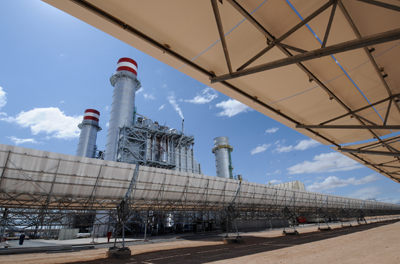Achieving Carbon Neutrality in the Maldives by Improving Energy Efficiency and Renewable Energy Programs

Summary
As part of its effort to reach carbon neutrality and mitigate against climate change threats, the Government of the Maldives began to modernize its fragmented, inefficient, and carbon-based electricity generation capabilities. While the Maldives realized that better regulation and Renewable Energy and Energy Efficient technologies were needed in the island economy, it lacked the knowledge to establish an efficient regulatory framework and to promote investment in these technologies. Other countries with similar geographic archipelago and island circumstances had successfully conducted such reforms—namely the Philippines and Reunion Island; the World Bank therefore funded and coordinated a knowledge exchange between energy policymakers to help the Government of the Maldives learn to develop policies, regulations, technologies, and institutions to promote renewable energy and energy efficiency.
A delegation from the Maldives with representatives from the Ministry of Housing, Environment Climate Change and Energy Department, Maldives Energy Authority, Environmental Protection Agency, and others visited the Philippines to meet with National Power Corporation and the Electricity Regulatory Commission of the Philippines.i The delegation also visited Reunion to meet with its Ministry of Energy, the French Government Regulatory Agency, and regional and department councils.
The two study tours increased awareness among Maldives decision-makers about electricity industry regulatory practices and renewable and energy-efficient energy policies. They gained the knowledge to implement strategies and policies to reform the energy sector and promote private sector investment in renewable energy technologies.
“There is great potential [to replicate] these initiatives and future cooperation between the South-South recipient and knowledge provider countries,” said Abdulaziz Faghi, Energy Specialist for South Asia at the World Bank. The participants “learned from the experiences of islands with similar energy profiles, therefore building internal capacity to identify opportunities to promote renewable energy technologies, strengthen governance and coordination among institutions involved in the energy sector.”
Beneficiaries / Participants
The Republic of the Maldives aims to become carbon neutral by 2020, while achieving energy self-sufficiency and reducing energy costs. But generating and distributing electricity in the Maldives is challenging: the Maldives is a nation of about 200 inhabited islands and 1,190 tiny islets spread over roughly 90,000 square kilometers in the Indian Ocean. Electricity generation in the Maldives depends on imported fuel, and the electricity sector is fragmented into 28 independent grid power systems on 33 islands, many of which rely on small, inefficient diesel generation systems. These problems have led to the highest electricity tariffs in the South Asia Region and shortages in electricity generation capacity. The Government of the Maldives outlined a strategy to achieve its ambitious energy efficiency goals. It appointed an electricity industry regulator and began to implement a regulatory framework, but the government did not know how to balance consumer and utilities’ interests, attract private sector investment, and promote renewable energy and energy efficiency. The Maldives wanted to better understand how other countries had established policies and a regulatory framework to promote wind, solar, and marine energy development and investment.
Comprising 7,107 islands in the western Pacific Ocean, the Philippines had implemented a regulatory framework proven to provide incentives for private sector participation and investment in renewable energy technologies, including a 33 Megawatt (MW) wind farm, a 1 MW solar plant, and mini-hydro, biomass, and geothermal power plants. These policies helped the Philippines reach 60 percent of energy self-sufficiency in 2010. Meanwhile, Reunion Island, a French Overseas territory in the Indian Ocean, had implemented similar innovative projects. With help from the French Government’s Green Energy program, Reunion—like the Maldives—also aims to reach carbon neutrality.ii
As part of a larger program to help the Maldives respond to pressing climate change threats, the World Bank’s South-South Facility agreed to fund a knowledge exchange between the Maldives and the Philippines and Reunion Island. A Maldivian delegation of representatives from the Ministry of Housing and Environment Climate Change and Energy Department, Maldives Energy Authority, Environmental Protection Agency, President’s Office, Climate Change Advisory Council, State Electric Company, and regional utilities visited the Philippines, where they met with the National Power Corporation and the Electricity Regulatory Commission of the Philippines, among other organizations. The delegation also visited Reunion to meet with the Ministry of Energy, the French Government Regulatory Agency, the Regional and Department Councils, and the Green Energy project administrators. The exchange’s objective was to help the Government of the Maldives increase its capability to develop policies, regulations, technologies, and institutions to promote renewable energy and energy efficiency.
Moving forward
As part of a wider strategy to help the Maldives, the World Bank administers the multi-donor Maldives Climate Change Trust Fund. The Government of the Maldives uses these funds to carry out priority projects relating to climate change adaptation and mitigation, including development of an energy sector plan to achieve carbon neutrality.
This exchange supported the preparation of the Maldives Clean Energy for Climate Mitigation Project (CECM), which aims to increase energy security and carbon neutrality through the use of renewable energy and the adoption of energy efficiency measures in small island communities. The project is being developed on Thinadhoo Island, the capital of the Upper South province of the Maldives. The CECM project supports the provision of grid-tied solar photovoltaic systems and energy efficiency technologies to displace costly diesel fuel generation and reduce carbon emissions. The project will also assist the regional utility’s capacity to deploy and operate solar power systems and support the island council and citizens of Thinadhoo in learning about energy conservation and efficiency.
Additionally, the Maldives planned to access funding from the Scaling Up Renewable Energy in Low Income Countries Facility (SREP), which supports renewable energy-based generation initiatives.v The lessons learned and the knowledge exchanged during the study tours and workshops helped inform and strengthen the SREP Investment Plan being prepared by the Government.

 China
China Colombia
Colombia Denmark
Denmark India
India Indonesia
Indonesia Mexico
Mexico Russian Federation
Russian Federation Spain
Spain United Kingdom
United Kingdom